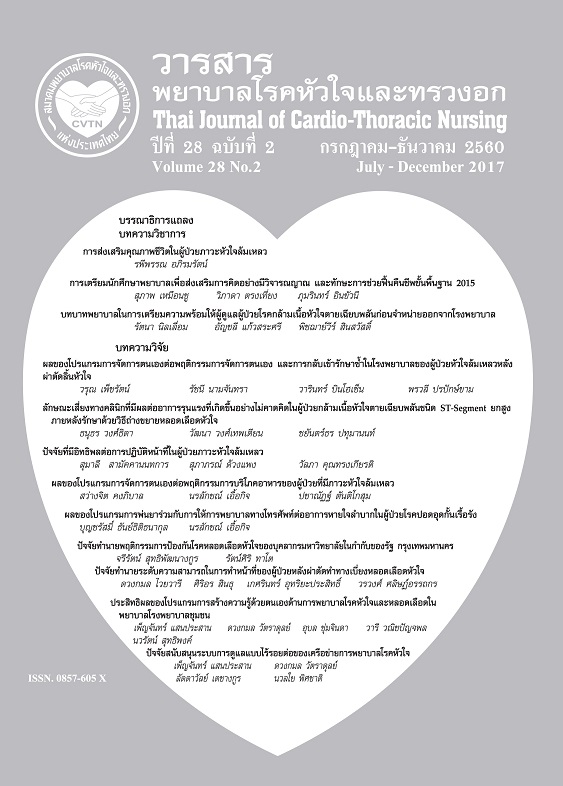ผลของโปรแกรมการจัดการตนเองต่อพฤติกรรมการบริโภคอาหารของผู้ป่วยที่มีภาวะหัวใจล้มเหลว = The effect of self-management program on eating behaviors of patients with heart failure
Keywords:
การจัดการตนเอง, พฤติกรรมการบริโภคอาหาร, ผู้ป่วยที่มีภาวะหัวใจล้มเหลว, self-management, eating behaviors, patient with heart failureAbstract
การวิจัยกึ่งทดลองนี้ มีวัตถุประสงค์เพื่อศึกษาผลของโปรแกรมการจัดการตนเองต่อพฤติกรรมการบริโภคอาหารของผู้ป่วยที่มีภาวะหัวใจล้มเหลวตามทฤษฎีการจัดการตนเองของ Creer กลุ่มตัวอย่างเป็นผู้ป่วยที่มีภาวะหัวใจล้มเหลวอายุ 18-59 ปี ที่มารับการรักษาในคลินิกโรคหัวใจ โรงพยาบาลจุฬาลงกรณ์ สภากาชาดไทย แบ่งเป็นกลุ่มควบคุมและกลุ่มทดลอง กลุ่มละ 22 คน กลุ่มควบคุมได้รับการพยาบาลตามปกติ และกลุ่มทดลองได้รับโปรแกรมการจัดการตนเอง ได้แก่ การให้ความรู้เกี่ยวกับภาวะหัวใจล้มเหลว การจัดการตนเอง ฝึกทักษะการจัดการตนเองทั้ง 6 ขั้นตอน ได้แก่ 1) ตั้งเป้าหมาย 2) การรวบรวมข้อมูล 3) การประมวลและประเมินข้อมูล 4) การตัดสินใจ 5) การลงมือปฏิบัติ และ 6) การประเมินผล มีระยะเวลาการดำเนินโปรแกรม 12 สัปดาห์ เก็บเครื่องมือโดย แบบสัมภาษณ์ข้อมูลส่วนบุคคล แบบประเมินพฤติกรรมการบริโภคอาหาร และแบบประเมินพฤติกรรมการจัดการตนเองในการบริโภคอาหาร วิเคราะห์ข้อมูลโดยสถิติเชิงพรรณนา และสถิติทดสอบค่าที
ผลการวิจัยสรุปดังนี้ ค่าเฉลี่ยของคะแนนพฤติกรรมการบริโภคอาหารของผู้ป่วยที่มีภาวะหัวใจล้มเหลวหลังได้รับโปรแกรมการจัดการตนเองสูงกว่าก่อนได้รับโปรแกรมการจัดการตนเองที่ระดับ .05 และค่าเฉลี่ยของคะแนนพฤติกรรมการบริโภคอาหารของผู้ป่วยที่มีภาวะหัวใจล้มเหลวกลุ่มที่ได้รับโปรแกรมการจัดการตนเองสูงกว่ากลุ่มที่ได้รับความรู้ตามปกติ อย่างมีนัยสำคัญทางสถิติที่ระดับ .05
ผลการศึกษาครั้งนี้เสนอแนะให้นำโปรแกรมการจัดการตนเองไปใช้ในการพัฒนาคุณภาพการดูแลผู้ป่วยที่มีภาวะหัวใจล้มเหลวที่แผนกผู้ป่วยนอกในโรงพยาบาลอย่างต่อเนื่อง เพื่อส่งเสริมให้ผู้ป่วยมีพฤติกรรมบริโภคอาหารที่เหมาะสม และขยายผลโดยศึกษาระยะยาว เพื่อติดตามความยั่งยืนของพฤติกรรมบริโภคอาหารที่เหมาะสม
The effect of self-management program on eating behaviors of patients with heart failure
The purpose of this quasi-experimental research was to study the effect of self-management program on eating behaviors of persons with heart failure, using Creer’s self-management theory. Adult patients with heart failure aged 18-59 years were recruited from the Heart Clinic, King Chulalongkorn Memorial Hospital. They were divided into control group (n=22) and experimental (n=22) group. The control group received the conventional nursing care while the experimental group received self-management programs including educating about heart failure, and self-management skill training, including 6 processes as: 1) goal selecting, 2) information collection, 3) information processing and evaluation, 4) decision making, 5) action, and 6) self-reaction. The program was conducted for 12 weeks. Data were collected using the demographic information, eating behavior and dietary control self-management questionnaires. Dependent and Independent t-test were used to analyze data.
The result revealed that the mean score of eating behaviors in the experimental group after receiving the self-management program was higher than that before receiving the program (p<.001) and the mean score of eating behaviors in the experiment group was higher than that in the control group (p<.01).
It is recommended that the self-management program should be applied at outpatient in hospital continuously to promote good eating behaviors in patients with heart failure.
Downloads
Published
How to Cite
Issue
Section
License
บทความนี้ยังไม่เคยตีพิมพ์หรืออยู่ในระหว่างส่งไปตีพิมพ์ในวารสารอื่น ๆ มาก่อน และกองบรรณาธิการขอสงวนสิทธิ์ในการตรวจทาน และแก้ไขต้นฉบับตามเกณฑ์ของวารสาร ในกรณีที่เรื่องของท่านได้ได้รับการตีพิมพ์ในวารสารฉบับนี้ถือว่าเป็น ลิขสิทธิ์ของวารสารพยาบาลโรคหัวใจและทรวงอก






